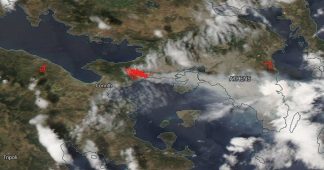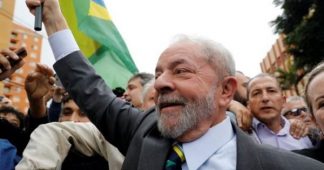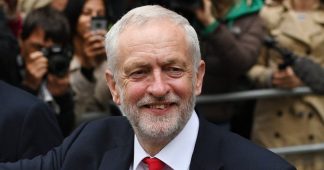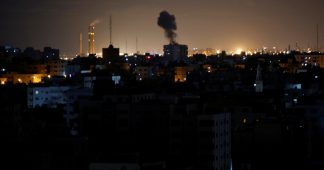26 Nov, 2018
Ukraine has declared martial law following a minor skirmish with Russian ships in the Kerch Strait. But why would Kiev take such a dramatic move now, five years after declaring itself at war with Russia?
Western headlines are once again sounding with warnings about “Russian aggression” after Russian ships opened fire on three Ukrainian military vessels attempting to cross the Kerch Strait on Sunday. Moscow says the vessels failed to notify of their intent to cross as required, and even denied having that intent on the night before. The Kerch Strait connects the Black Sea and the Azov Sea and separates Crimea from the Russian mainland.
The incident, which saw the Ukrainian ships detained and some sailors treated for injuries, was quickly framed as Russian aggression by many pundits and prompted vows of support for Ukraine from European Union officials. As always with mainstream Western coverage of Russia and Ukraine, it’s worth looking a bit more closely to decipher what parts of the story are being left out or sidelined.
I condemn Russian use of force in Azov Sea. Russian authorities must return Ukrainian sailors, vessels & refrain from further provocations.
I discussed situation with Pres. @poroshenko and will meet his representatives later today.
Europe will stay united in support of Ukraine.— Donald Tusk (@eucopresident) November 26, 2018
Kiev responded swiftly to the Kerch Strait incident, with President Petro Poroshenko announcing that a period of martial law would be imposed. He also claimed that a “serious threat” of “ground invasion” now exists, citing a “secret” document.
Curious timing?
It’s important to remember that this dramatic move of declaring martial law was not even considered in 2014 and 2015, during the bloodiest periods of fighting in eastern Ukraine. Though Poroshenko was claiming at the time that thousands of Russian troops and hundreds of Russian tanks had invaded his country, that still didn’t merit imposing martial law.
Yet now, in response to a relatively minor incident, by comparison, Kiev has decided to take that step. As such, the most important question being raised by analysts skeptical of the narrative from Kiev is, why?
The answer many are coming up with is simple but highly plausible: The standoff between the Ukrainian and Russian ships could have been a planned provocation – a domestic ploy aimed at swinging a potentially unwinnable election.
Another issue is Ukraine holds elections early next year. And incumbent President, Poroshenko, is polling only third, behind a comedian & Yulia Timoshenko. Many Ukrainian cities are without heat in sub zero temps & parts of Kiev have no hot water. This ‘crisis’ helps distract.
— Bryan MacDonald (@27khv) November 25, 2018
President Poroshenko is reportedly asking parliament to introduce martial law in Ukraine. This just months before an election in which he is trailing in the polls… https://t.co/rQvHsIUc95
— Alec Luhn (@ASLuhn) November 25, 2018
Ukraine is set to hold elections early next year and the incumbent Poroshenko is performing dismally in the polls at just eight percent, trailing opposition politician and former prime minister Yulia Tymoshenko – and even a famous comedian who has not actually confirmed his candidacy.
Indeed, it is a well-known fact worldwide that being in a state of war helps engender support for the powers that be as they vow to protect the country from outside threats. Originally, Poroshenko had suggested a 60-day period of martial law, but facing public outcry over the effect this could have on the planned March elections, the president capitulated and recommended that lawmakers vote to support a 30-day period.
Poroshenko now says that presidential elections will be held on time at the end of March, promises to announce the date officially after the end of martial law period, which will now last 30 days instead of initially proposed 60. So what’s the goal? https://t.co/c51hOae9Kp
— Leonid Ragozin (@leonidragozin) November 26, 2018
Conveniently, martial law grants great powers to the government of Ukraine to limit civil freedoms, including the freedom of the press and freedom of assembly. In practice, this would mean that a news publication or TV station could be shut down if the government decided it was a threat to national security. It also allows authorities to ban peaceful protests and any other mass action it deems a threat. Kiev could even restrict travel for Ukrainians, banning them from leaving the country altogether.
According to @poroshenko’s “martial law” decree, anyone who openly claims that Ukraine is aggressive towards Russia can be charged under “state treason” (Article 111), which means at least 5 years behind bars.
Meanwhile, in Russia you are free to criticise Putin all you want.
— Ollie Richardson (@O_Rich_) November 26, 2018
Poroshenko is now in total control of all Ukrainian mass media and army.
— Russian Market (@russian_market) November 26, 2018
Citing Poroshenko’s disastrous polling numbers, journalist Mark Ames suggested that “plenty more campaign-season provocations” could be on the way from Kiev.
Context: Ukraine's election ~4 months away, and billionaire nationalist president Poroshenko polling dismal 8%, well behind rival billionaire(?) nationalist Yulia "Gas Queen" Tymoshenko. Expect plenty more campaign-season provocations https://t.co/zeFoR3S8Wb
— Mark Ames (@MarkAmesExiled) November 25, 2018
Nothing a true European democrat like Poroshenko wants more than to hold elections with his 8% rating, but unfortunately evil Russia is forcing him to declare martial law and all that goes with it https://t.co/ZVOvqdMuDc
— Mark Ames (@MarkAmesExiled) November 25, 2018
With elections due in March, and with his own party far behind in most opinion polls, @poroshenko now uses #AzovSea clash to propose #Ukraine martial law, giving his military the power to control media, stifle protest, and potentially cancel 2019 electionshttps://t.co/t0XlJJpkC0
— Charles Shoebridge (@ShoebridgeC) November 25, 2018
Another suggestion has been that Poroshenko is trying to engage the sympathies of the West ahead of the G20 summit, which is to be held in Argentina this week – and perhaps even to derail a planned meeting between US President Donald Trump and Russian President Vladimir Putin.
So maybe I’m not mad to suggest this incident engineered to help poroshenko in polls and goodlight at g20.
But honestly idk. All I’m saying is we shld all be v careful before calling conclusions as clearly lots of moving parts here. https://t.co/06ypBOasp2
— BenAris (@bneeditor) November 25, 2018
What’s going on in Kerch? Russia is asserting its control over disputed waters between Crimea & the Russia mainland. And Ukraine is trying to kibosh Putin’s planned meeting with Trump at the G20 next week. That’s my best guess as to why it’s happening now.
— Bryan MacDonald (@27khv) November 25, 2018
Resorting to such drastic measures ahead of an election might be the surest sign yet that Poroshenko knows his presidency has been a failure. In 2013, the Euromaidan protests were depicted as a liberating movement to oust autocrat Victor Yanukovich with his “dictatorial laws,” suppression of the press and riot police patrolling the streets. Five years on, with Ukrainians now amongst the poorest in the world while corruption reigns supreme, Poroshenko appears to be grasping at his waning power, using every trick in a dictator’s playbook as the West turns a blind eye.
Poroshenko’s entire campaign is based on support for the Ukrainian military. His campaign slogan is “Army, Language, Religion” – so it would be little wonder that he might use some kind of military provocation as a last-ditch effort to score some political points.
Published at https://www.rt.com/news/444928-martial-law-poroshenko-election-kerch/











